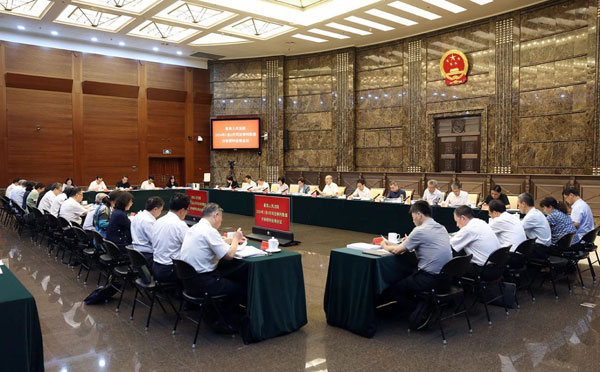SPC holds consultation meeting on judicial adjudication data analysis for H1

The Supreme People's Court (SPC) holds a consultation session on the analysis of judicial adjudication data for the first half of this year on July 12. Zhang Jun, president of the SPC, chaired the meeting. [Photo/court.gov.cn]
On July 12, the Supreme People's Court (SPC) held a consultation session on the analysis of judicial adjudication data for the first half of this year. Zhang Jun, president of the SPC, chaired the meeting in Beijing.
Statistics indicate that the quality and efficiency of judicial adjudication have continuously improved nationwide since the start of the year. The growth in newly received cases has significantly slowed, and the number of first-instance enforcement cases has markedly decreased, indicating that both litigation-source governance and enforcement-source governance have achieved phased success. Among the 26 indicators for adjudication quality management, 23 have shown year-on-year improvement.
Addressing the meeting, Zhang emphasized the need to actively leverage the role of judicial adjudication data to properly implement adjudication management in accordance with judicial rules.
To enhance the quality and efficiency of judicial work, it is essential to manage effectively and apply pressure where necessary, he said. The key is to be scientific, comply with judicial principles and not burden frontline judges unnecessarily, he added.
Zhang said that courts nationwide are encouraged to adapt indicators to their specific circumstances to facilitate better implementation. It is crucial to use indicators as a guide to prioritize quality and adequate outcomes, ensuring that cases are handled thoroughly and efficiently without solely pursuing a speedy resolution, he said.
Firm implementation of case registration is essential to prevent manipulation of case-filing under the guise of litigation-source governance, and any problems related to inadequate implementation of case registration must be thoroughly investigated, he added.
Effective supervision and guidance must be integrated into daily work, Zhang said, adding that leaders of the people’s courts at all levels must take responsibility for judicial supervision, ensuring thorough case reviews and enhancing overall judicial enforcement quality and efficiency.
Special supervisory inspections should be conducted through methods such as cross-checking and random sampling to address any potential issues related to inaccurate data reporting or rushed case closures, he added.







